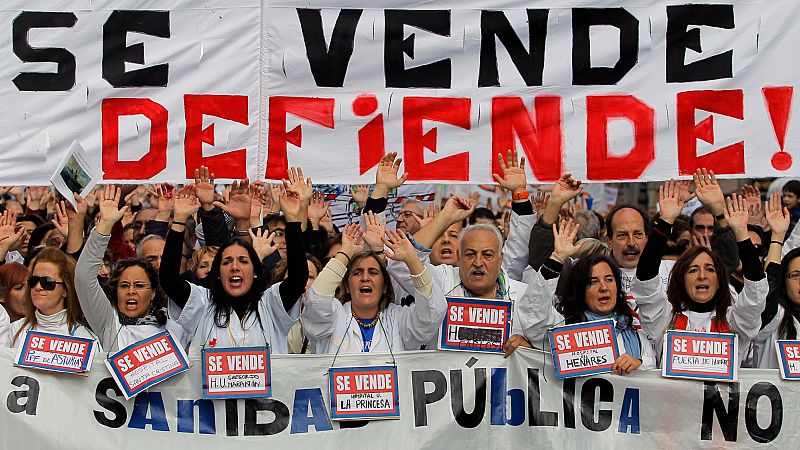
Would you pay higher taxes for better public services? Or would you accept lower quality services in exchange for lower contributions? Europeans are split, but more people favour reducing taxes.
Four in ten (39%) in the EU agree that ‘taxes are too high, and they would decrease them even if this means fewer or lower public services'. These amenities include healthcare, education and public infrastructure.
“The economic difficulties in Europe right now may explain this deterioration of support for higher taxes,” Olivier Jacques, assistant professor at the University of Montreal, told Euronews Business.
On the other hand, more than a quarter (27%) of people in the EU support ‘paying higher taxes for better and more public services’.
A similar proportion (26%) of respondents support the current levels of taxes and public services. The remaining 8% are unsure.
When we look at the responses among different EU countries, the responses vary widely. Answers were collected in response to a Eurobarometer survey, conducted in April 2025.
Cutting taxes may come with a cost
Slovakia (59%), Croatia (57%), Estonia (53%), and Slovenia (50%) top the list of countries where many say taxes are too high and should be cut, even at the cost of public services. Half or more of the population would accept this option in these countries.
Support is also 45% or higher in Greece and Romania (48%), Poland (47%), and Belgium, Latvia, and Hungary (45%).
Dr Dimitri Gugushvili, post-doctoral researcher at KU Leuven University in Belgium, explained that people usually oppose more taxes if they distrust the government and suspect that extra funds will be abused by public officials.
“There is a massive difference in trust in public institutions across Europe, with political trust being the highest in Scandinavia and the lowest in Eastern Europe, especially Bulgaria and Romania,” he said.
Finland (22%), Sweden (24%), and Denmark (26%) — the three Nordic countries — show the lowest support for tax cuts over public services, with only around a quarter in favour.
Germany (40%), France (37%), and the Netherlands (39%) are close to the EU average.
In general, Eastern and Central European countries lean much more towards tax cuts at the expense of services. Northern and Western European countries are less willing to cut public services.
“Support for taxation is higher when people perceive that the public services they receive in exchange for their taxes are of higher quality or when they maintain high levels of trust in government institutions,” Jacques said.
He pointed out that the countries where support for taxation is lower seem to be nations with low trust in government and low satisfaction with public services.
Which countries are willing to pay more?
Only 27% of respondents in the EU support ‘higher taxes for more or better public services’. Spain (42%), Sweden (42%), and Finland (40%) lead in support, while Bulgaria (39%) and Greece (37%) follow closely.
This highlights a strong demand for increased investment in public services across Southern Europe, with Spain and Greece leading the way. Italy and Portugal (both at 31%) also show above-average support, reflecting similar trends in this region.
Olivier Jacques' own research shows that higher levels of education, as well as left-wing ideology, correlate with higher support for taxation.
“Left-wing identification is very high in Spain, and the Spaniards have by far the highest support for taxation of the Southern European countries,” he said.
Bulgaria is an outlier in Eastern Europe, with responses suggesting that people there want stronger services even if taxes rise.
The lowest levels are seen in Luxembourg (16%), as well as Latvia, Slovakia, and Belgium (all three 17%), indicating strong resistance to tax increases. In Eastern and Central Europe, the support is generally lower: Poland, Hungary, Romania, Lithuania, and Slovenia all fall in the 22–23% range.
Germany (20%), Austria (20%), and France (23%) are also among the least supportive.
However, not supporting higher taxes does not necessarily imply opposition to better or improved public services; it may instead reflect a demand for greater efficiency. The same reasoning could also apply to those favouring tax reductions.
Keeping services and taxes at the same level
A significant share of the EU population, around a quarter (26%), believes that both taxes and public services should remain at their current levels, though opinions vary widely across member states.
Support for the status quo is strongest in Luxembourg (47%), Malta (46%), and Denmark (43%), where nearly half of the population holds this view.
Support for this option is also above the EU average in Austria (37%), Finland (34%), France (32%), and Germany (31%), indicating a preference for stability.
Support is low in Southern Europe, with many countries falling well below the EU average: Greece (11%), Croatia (13%), Italy (18%), Spain (21%), and Portugal (25%). This demonstrates public discontent and a desire for change.
Personal income tax rates differ widely across Europe, with the highest levels in the Nordic countries and the lowest in Eastern Europe.







